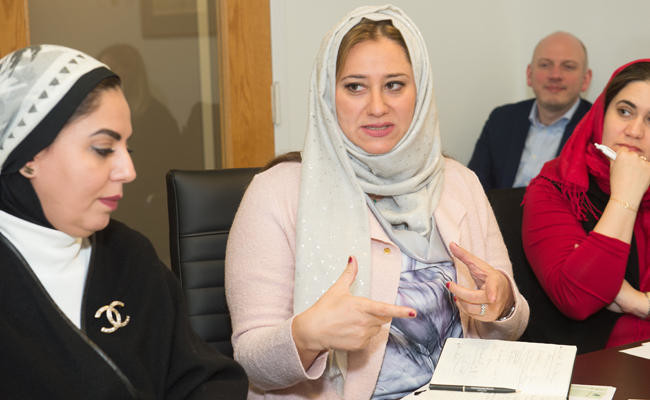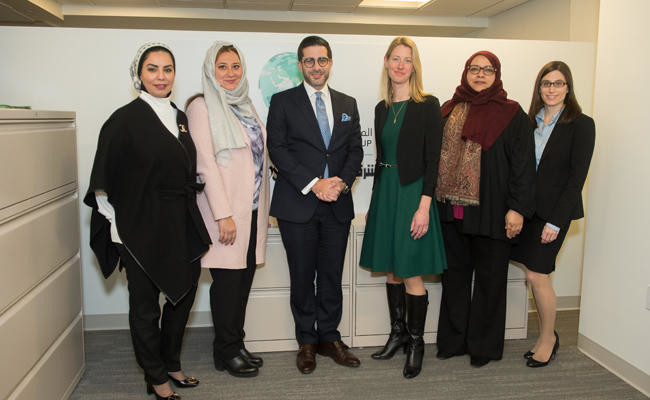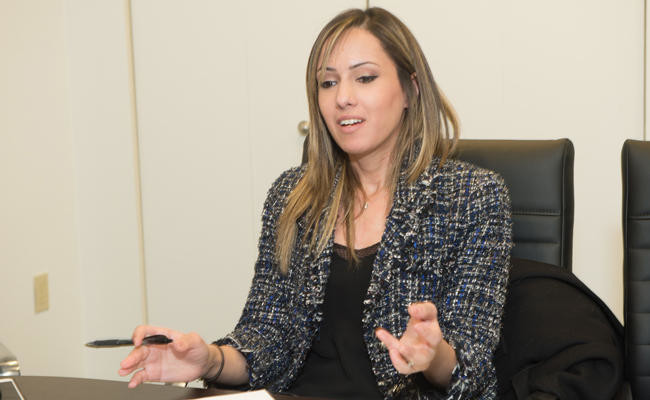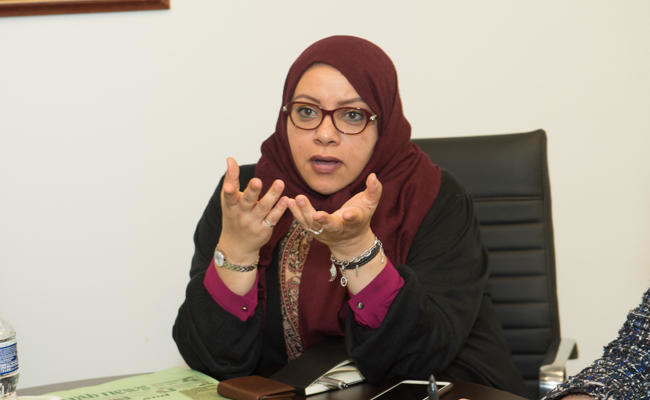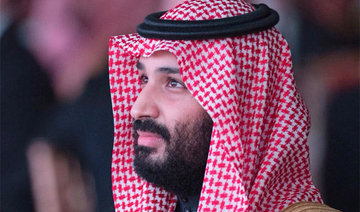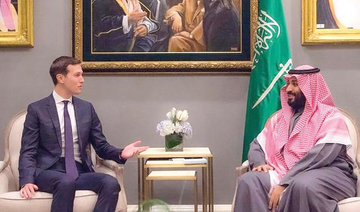WASHINGTON: All Saudis have a personal oil well in their back yard, women from the Kingdom are widely repressed and definitely cannot speak English, and all Americans play beach volleyball.
These are just some of the common stereotypes raised by panelists at an Arab News roundtable discussion held in Washington on Friday, in which women from Saudi Arabia and the US debated public views about their nations and how misperceptions can be addressed.
The discussion, held during the visit by Saudi Crown Prince Mohammed bin Salman to the US, heard about both perceptions of citizens of the two countries and about the societies as a whole.
Kerry Boyd Anderson, a US-based political risk consultant and writer, said that Saudi Arabia still struggled with an image problem in the US — although she said that the visit by the crown prince was important in addressing this.
“Saudi Arabia is still struggling with the post-9/11 perception problem in the United States … Even though those of us who actually follow the Middle East know there has been massive change,” she said.
“It’s going to take a lot of effort if you actually want to change American perceptions.”
Allegations about Saudi Arabia’s human rights record were also raised as impacting American public perceptions, Boyd Anderson said. But the move to allow women to drive from this summer provided an image boost, she added.
“A lot of Americans tend to think of Saudi women as very repressed. And I think that the move to allow women to drive … was very important for a lot of Westerners to see. Because it was always the thing a lot of people would talk about,” she said.
The roundtable discussion was the first event to be held in the recently inaugurated Saudi Research and Marketing Group office in Washington, which will be home to Arab News’ planned bureau in DC. The discussion, titled “Vision 2030 and the Role of Women in Saudi Reforms,” was moderated by Faisal J. Abbas, editor in chief of Arab News.
Somayya Jabarti, the editor in chief of Saudi Gazette, said that the move to allow women to drive was just the start of reforms for women in her country.
“This is the beginning. The decision (to allow) women to drive was for practical reasons mostly. It wasn’t to improve the image of Saudi Arabia or to justify ourselves,” she said.
“I think the next step, which is much more important, concerns the male guardianship system, which I believe is sort of being dismantled, bit by bit. Which I also think is a very intelligent approach, so it doesn’t provoke the challenging forces.”
Under the male guardianship system, Saudi women must receive permission for certain activities, such as traveling abroad.
But Jabarti said that the system had been misinterpreted by the international media, with claims that women cannot, for example, open a bank account or gain access to health care without permission.
“The Western media seems to get it wrong when it comes to what we can do and cannot do in relation to the male guardianship system,” she said.
Other members of the discussion group also pointed to the media’s role in covering Saudi society. Rania A. Razek, a Saudi-American photographer, said the global media has only intermittent interest in Saudi women’s affairs.
“It’s as if it’s a snooze on an alarm clock. Once something happens, a woman does something, it goes on the media for one day, and then it’s snoozed for another two years. And then something else happens, a woman does something else and it’s news, and then the world sees it once and then forgets it,” she said.
Jabarti said that, despite the easing restrictions on women in Saudi Arabia, hers is not the first generation to thrive.
“It isn’t (only) now that women are becoming doctors, academics and scientists. We’re not even part of the pioneering generation of women professionals in Saudi Arabia. We’re part of maybe the third or the fourth … Regardless of all the restrictions that have existed, women have achieved. So I think we need to give credit to the women who have come before us,” she said.
She said that there are other misconceptions and stereotypes about Saudis. “We still get the ‘oil well in your back yard’ (comments) … The stereotype that we’re all rich,” she said. “(Some) people are surprised that I’m Saudi and I speak English.”
Dr. Mody Al-Khalaf, Shoura council member and former diplomat at the Saudi Embassy in US, discussed the council’s involvement in an anti-harrassment law for women.
She also raised the recent CBS interview with the Saudi crown prince, in which he acknowledged that Saudi women “still have not received their full rights. There are rights stipulated in Islam that they still don’t have.”
Al-Khalaf said: “He was very honest about women not having all their rights within Shariah. That was the first time, for me, to hear an authoritative figure say, ‘Yes, women in Saudi Arabia still do not have all their God-given rights’.”
Lina Al-Maeena, Shoura council member and women’s sports enthusiast, explained how the Shoura is a consultative council for the king, giving recommendations and assessing and amending existing laws.
But she dismissed the “stereotype” that female members of the Shoura only involve themselves in issues connected to women’s affairs. “We should be the voices of everybody in the Kingdom,” she said.
But stereotypes work both ways, she added — such as the notion that all Americans enjoy beach volleyball.
“A lot of people don’t realize that a lot of American families are very conservative, they are very religious,” said Al-Maeena.
Conversely, not everyone in Saudi Arabia is as conservative as some might think, another member of the discussion group said.
The US-based Dr. Ellen Wald, energy consultant and author of the book “Saudi, Inc.,” pointed out that women already drive cars in Saudi residential compounds attached to the energy company Aramco.
“Most people I’ve spoken to have no idea that women at Aramco do drive in the Aramco area (and) don’t wear abayas,” Wald said. “There’s a lot of things that people don’t know.”
Faisal J. Abbas, editor in chief of Arab News, said that there was too much attention paid to what women wear regardless of whether they are from Saudi Arabia or San Francisco.
“In all societies there is an obsession with what women wear, be it too little or too much. Let’s stop judging women on what they wear, and let’s start judging them on what they do,” he said.
The roundtable discussion also put forward some recommendations for how to improve perceptions.
Wald said that she had found it difficult to get a visa to Saudi Arabia despite spending years researching a book on the country.
Easing such restrictions, as well as providing more efficient embassy services and information, would all help improve public perceptions, Wald added.
“I called the Saudi Embassy so many times to try to talk to them about a visa, and no one would up the phone,” she said. “There’s no information for Westerners about going … There are no guidebooks about Saudi Arabia.”
Ola Salem, head of communications at the Washington-based Arabia Foundation, said that access to Saudi Arabia for the media was also important.
“Journalists have access to Dubai and the UAE so much easier than Saudi Arabia. That’s why you don’t see (many) pictures of women from Saudi Arabia, because (the media) can’t get it,” she said.
Saudi, US women discuss stereotypes, common challenges at Arab News DC roundtable
Saudi, US women discuss stereotypes, common challenges at Arab News DC roundtable

How Saudi Arabia is using innovation, research, and regulation to turn waste into a circular economy success

- Engineering, AI and cross-sector partnerships are driving sustainable solutions to manage 110 million tons of waste annually
- New laws, financial incentives and rising investor interest are reshaping the Kingdom’s waste management and recycling landscape
RIYADH: As Saudi Arabia accelerates toward a circular economy under Vision 2030, experts say universities, research institutions, and business leaders are playing a crucial role in developing innovative waste management solutions that align with national sustainability goals.
In early 2024, Saudi Arabia’s Ministry of Environment, Water and Agriculture announced a waste management plan aiming to recycle up to 95 percent of waste and add SR120 billion ($31.99 billion) to the Kingdom’s gross domestic product.
Saudi Arabia generates more than 110 million tons of waste each year, much of it originating from cities like Riyadh, Jeddah, and Dammam. Its waste management market is projected to grow from $5.97 billion in 2025 to $8.72 billion by 2030, according to Mordor Intelligence.

To meet this challenge, academic partnerships, regulatory reforms and emerging technologies are coming together to reshape the sector, Sultan Al-Muaythir, chairman of the civil engineering department at Prince Sattam bin Abdulaziz University, told Arab News.
Forming knowledge-sharing agreements with leading countries in waste management, he said, is a strategic step toward building a sustainable, locally adapted system that draws on global best practices and aligns with Saudi Arabia’s circular economy ambitions.
To drive innovation in the sector, Al-Muaythir emphasized the importance of interdisciplinary support. Fields like civil engineering, landfill and waste management, geotechnical engineering, and soil sciences all contribute to the design and development of critical infrastructure.

Mechanical engineering plays a key role in advancing collection and treatment equipment, while chemical, agricultural and biotechnology engineering disciplines help analyze waste composition and develop transformation processes.
Electrical engineering, he added, is essential for operating smart systems and managing energy generated through treatment.
Al-Muaythir also pointed to the Kingdom’s updated regulatory landscape, particularly the introduction of the Waste Management Law and its executive regulations, as a strong foundation for encouraging innovation and investment in sustainable practices.
He explained that the next phase calls for faster plan implementation, broader international research collaboration and direct incentives for advanced processing technologies — steps that would speed up the Kingdom’s progress toward its environmental and development goals.
While government action is essential, Al-Muaythir said innovation in waste management is not a luxury, but a necessity for building a clean environment and a functioning circular economy.
He added that individual responsibility plays an equally important role. “Adopting conscious behaviors towards waste and committing to sorting and reuse/recycling constitute the first building blocks in creating a more sustainable future,” he said.
Expanding on this vision, Abdullah Alakel, chairman of the Saudi Scientific Research and Innovation Association, said waste management innovation is a cornerstone of Vision 2030’s broader goal to build a circular and sustainable economy.

He told Arab News that scientific research is a key driver in tackling environmental challenges — from recycling and waste-to-energy technologies to the use of artificial intelligence to improve sorting and collection processes — ultimately boosting operational efficiency and reducing environmental harm.
To support this ecosystem, the association provides business incubators and innovation accelerators, offering technical and financial assistance. It also facilitates connections between researchers, donors and investors to help turn ideas into market-ready solutions.
Alakel noted that several joint initiatives with academic and industrial partners are already underway, including efforts to convert organic waste into economic products such as fertilizers and biofuels.
DID YOU KNOW?
• Saudi Arabia aims to recycle up to 95 percent of its waste by 2040. Waste management sector is projected to contribute $32bn to GDP by 2040.
• Half of the Kingdom’s waste comes from Riyadh (21 percent), Jeddah (14 percent) and Dammam (8 percent).
(Sources: Ministry of Environment, Water and Agriculture and the National Center for Waste Management)
Other projects aim to develop scalable recycling technologies and improve overall waste management efficiency.
Beyond research, the association works to foster a culture of sustainability across society. Alakel said it organizes public awareness campaigns, educational workshops in schools and universities, and national competitions that encourage creative, environmentally responsible solutions.
He added that the association plays a critical role in bridging academia and implementation by hosting scientific conferences, building strategic partnerships and supporting national innovation deployment in alignment with Vision 2030’s environmental goals.
Farah Al-Gharib, CEO of Precision & Choice Environmental Solutions, echoed those views, underscoring the opportunity to enhance coordination between stakeholders as Saudi Arabia moves toward a circular economy.

She told Arab News that aligning regulations, expanding infrastructure for sorting and collection, and stimulating private investment remain key challenges. Raising public awareness and promoting innovation are also essential to achieving sector-wide transformation.
To accelerate progress, Al-Gharib called for a more integrated and flexible system that encourages public-private partnerships. Activating source-level sorting and offering financial incentives to investors, she said, would help drive growth in the sector.
Clear metrics, such as waste reduction, cost savings and job creation, should be used to measure success.

Looking ahead, she expects more companies to invest in smart technologies and expand their collection and treatment networks. Seamless integration across the entire waste value chain — from source to processing and redistribution — is essential, she said, to avoid bottlenecks and uphold the core principles of the circular economy.
“Based on our experience in the sector, we believe that unifying and updating regulations under a single, clear, and transparent regulatory framework would directly contribute to attracting investors, reducing the complexity of procedures and the classification of recyclable products, thereby accelerating regulatory processes and stimulating production,” said Al-Gharib.
She concluded that clear legislation and coordinated responsibilities across authorities are key to scaling up circular economy initiatives effectively and sustainably.

Hayy Cinema hosting classic movie program for children in Jeddah

- The program includes twice daily screenings of classic Arab cartoons that have left a lasting impression on viewers and a complementary range of artistic activities inspired by the films
JEDDAH: Hayy Cinema in Jeddah is running an entertainment program that provides an interactive experience to evoke childhood memories and strengthen cultural bonds between generations.
The program includes twice daily screenings of classic Arab cartoons that have left a lasting impression on viewers and a complementary range of artistic activities inspired by the films.
Hayy Cinema, which is an Art Jameel initiative, provides a unique approach to film presentation. Its facilities include a 168-seat theater, private screening room, multimedia library and an educational exhibition, all designed with architectural inspiration drawn from the history of Gulf cinema.
The children’s program runs until Sunday.
Falcon breeders auction to be launched in August

- The season will start with the International Falcon Breeders Auction, running from Aug. 5-25, showcasing top local and international falcon farms
RIYADH: The Saudi Falcons Club has announced its schedule for the current year, featuring six major events spanning a total of 122 days in Malham, north of Riyadh, and other venues across the Kingdom.
The event is designed to engage a broad audience interested in falconry, hunting and related cultural traditions.
The season will start with the International Falcon Breeders Auction, running from Aug. 5-25, showcasing top local and international falcon farms.
The Saudi Falcons Club Auction will run from Oct. 1 to Nov. 30, serving as a key platform for presenting top local falcons and providing a reliable economic avenue for falconers.
The International Saudi Falcons and Hunting Exhibition, the largest of its kind in the region, will take place from Oct. 2-11. It will feature exhibitors from both within and outside the Kingdom, showcasing the latest equipment and supplies for falconry, hunting, travel, weapons and outdoor adventures.
Saudi transport officials conduct more than 317,000 inspections in June

- Makkah region reported the highest number of offenses at 21,000, followed by Riyadh at 13,000, Eastern Region at 4,508, and Madinah at 3,557
RIYADH: The Saudi Transport General Authority carried out more than 317,000 inspections covering land, sea, and rail transport activities across the Kingdom in June, identifying 51,143 offenses.
Of these, 27,756 were detected through field inspections and 23,387 through automated monitoring, while all efforts involved collaboration with relevant authorities, the Saudi Press Agency reported.
Compliance rates were robust, with land transport achieving 94 percent compliance and maritime transport recording an impressive 99 percent. These figures highlight licensees’ strong adherence to the rules and regulations.
Makkah region reported the highest number of offenses at 21,000, followed by Riyadh at 13,000, Eastern Region at 4,508, and Madinah at 3,557. Qassim recorded 1,914 violations, Tabuk 1,316, and Aseer 1,073, while the remaining violations were from other parts of the Kingdom.
Japan’s crown prince visits Saudi pavilion at Osaka Expo

- Visited in the company of Saudi Ambassador to Japan Ghazi Faisal Binzagr.
TOKYO: Japan’s Crown Prince Fumihito and Crown Princess Akishino visited Saudi Arabia’s pavilion at the Osaka-Kansai Expo on Thursday, in the company of Saudi Ambassador to Japan Ghazi Faisal Binzagr.
“We were deeply honored by the visit of their Imperial Highnesses,” Binzagr told Arab News Japan. “It was a beautiful visit.”
He noted how much the pair had enjoyed the music of the oud, which was being played as the imperial guests entered the courtyard of the pavilion and which echoed throughout the building owing to the design of the walls and corridors to amplify the sound.
“The imperial couple also enjoyed Saudi coffee and (a selection of various) dates,” Binzagr said, adding that the variety and color of Saudi dates is influenced by the minerals in the soil of each region where they are grown in the Kingdom.
Binzagr said they had discussed the similarities in the cultures of Saudi Arabia and Japan, adding that despite appearing different, they shared a deep pride in their heritage and history, and both countries' ability to link the East and West.
He added that Japan is authentic with what it has but is also able to blend it with foriegn best practices with its great openness. Binzagr said that he believes this makes for something very special that Saudi Arabia also shares with Japan.
“We both value our roots and connectivity, and we both seek to celebrate balance in everything we do,” he said.
At the pavilion, the imperial couple viewed the plan for Riyadh Expo 2030 and indicated they were keen to visit at that time or even before, Binzagr said.
“We are keenly looking forward to more visits between members of Japan’s Imperial Family and members of our Royal Family of Saudi Arabia,” Binzagr added.
”Such visits add a special dimension to an already special relationship.”


